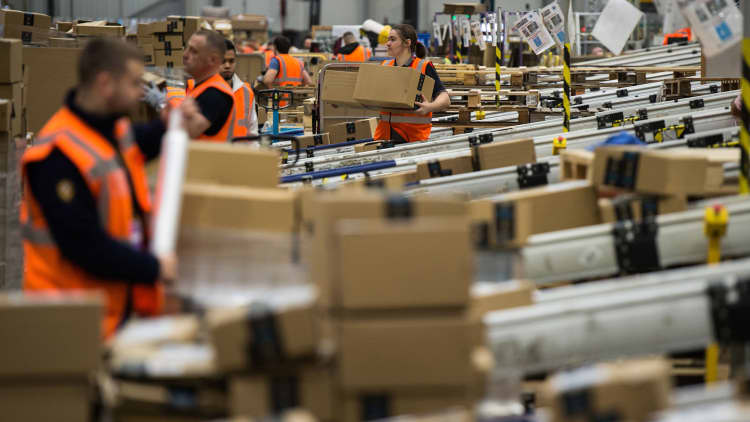
It can be tough for small businesses to compete with the online retail giants of the world like Amazon. But when the two team up together, it can be a win for both parties.
Amazon says that more than half of the items it sells online actually come from small businesses. A big driver of this trend is Fulfillment by Amazon, the program that lets small businesses offer Prime two-day shipping by preshipping their items to Amazon fulfillment centers, and letting the company handle packaging, shipping and customer service.
Some 2 billion items were sold this way across the globe last year alone, according to Amazon. And this year, small businesses sold 140 million items from the Thursday of Thanksgiving through Cyber Monday alone.
To participate, Amazon charges fees for storage and shipping, depending on the size of the items. But small business owners like Steve Grubbs say it's well worth it.
Grubbs is owner of VictoryStore.com, based in Davenport, Iowa, and has been participating in the program for about five years. The fees can sometimes run him 30 percent, as he sells giant greeting cards and signs that can be 6 feet tall. But the payoff is exposure and new customers, who increasingly limit their searches on Amazon to Prime offerers. Today, about 70 percent of the $1.1 million he is on track to do this year is fulfilled by Amazon.
"People trust it — they know Amazon is going to take care of them and so they use Prime all the time now," Grubbs says. "There are so many challenges with online retail and we've battled them for 20 years. Amazon takes a lot of those away — credit card security, marketing and sales, shipping and fulfillment."
But the partnership also means small retailers can lose a degree of control. Jack Brecher, owner of JR William, a luxury goods retailer based in Queens, New York, says he has little contact with his customers and faces lower rankings on the site if he opts to fulfill items on his own.
"If your listing is fulfilled by merchant on Amazon, then the chances of you becoming a hot seller are slim to none," Brecher says. "The positive aspects of using FBA can't be underestimated — not having to deal with shipments, specific issues with fulfillment. These are things that could take up all day for small business owners like myself. Time is our biggest resource and freeing up time is absolutely a huge value."
Amazon does not reveal how many small business owners participate in the fulfillment program, but it defines them as businesses with 1,500 employees or fewer. Data analytics firm Potoo says there are some 4 million sellers on Amazon and the company adds more than 1,000 sellers daily. The number of sellers on Amazon has more than doubled in the past five years, Potoo says, adding that resellers are also included in this category.
Small business owners have mixed opinions on Amazon and what it means for Main Street. CNBC and SurveyMonkey polled small businesses on the e-commerce giant last quarter and found about one-third think Amazon is good for business, nearly half say Amazon is bad for business, but less than 10 percent said they actually compete with Amazon for customers.
One thing is for sure — as the FBA program and its sales grow, small retailers like Grubbs say competition is also on the rise.
"You need to keep prices as tight as you can, and you have to make sure you have products people want," Grubbs says. "If you don't deliver a quality product, you won't get a high star rating and low ratings will kill your product."


